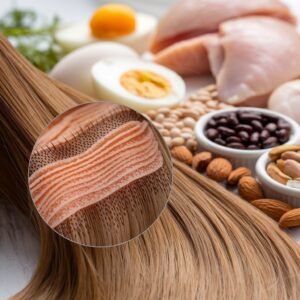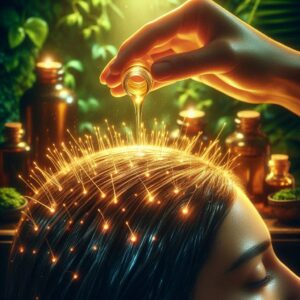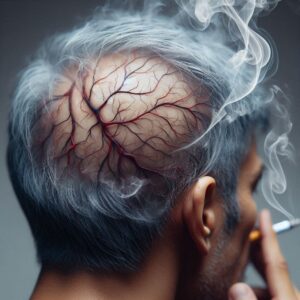The Ultimate Guide to Healthy Hair
Hair health is essential to overall wellness, and everyone should be familiar with the concepts that promote healthy hair. On the skin’s surface, you may find the protein keratin in the hair follicles. Layer one is the medulla; layer two is the cortex; and layer three is the cuticle, which makes up each hair.
How well these layers are taken care of determines the overall health and appearance of the hair. The health of the hair follicle, the living part of the hair, is affected by several things, such as heredity, age, and overall well-being. Keep the follicle in good condition if you want strong and vibrant hair growth.
When one is familiar with the basics of hair health, the three stages of hair development—a resting phase, a transitional phase, and a growth phase—become apparent. Everyday hair loss is normal for this cycle, but excessive shedding might indicate a more serious issue. Keeping a healthy scalp, encouraging strong hair follicles, and supporting the natural development cycle of hair are the cornerstones of good hair health.
Takeaways
- Several factors, such as genetics, diet, and way of life, influence hair health.
- Protein, minerals, and vitamins are the building blocks of healthy hair.
- Proper hair care and maintenance behaviours, such as washing and conditioning your hair regularly, may help prevent damage and promote hair health.
- Coconut oil and aloe vera are natural remedies for hair issues and improve overall health.
- To keep your hair in good condition, you should avoid using products and methods that are harmful to it, such as excessive heat styling tools and chemicals.
 The Importance of a Balanced Diet for Healthy Hair
The Importance of a Balanced Diet for Healthy Hair
Proteins and Their Worth
Protein is required to maintain healthy hair. Inadequate protein intake might result in weak, brittle hair or hair loss.
Hair-Favorite Minerals and Vitamins
In addition, vitamins A, C, and E, along with minerals like zinc and iron, are critical for promoting healthy hair growth. To ensure the body receives the nutrients necessary to maintain healthy hair, it is recommended to incorporate a variety of fruits, vegetables, lean meats, and whole grains into the diet.
Omega-3 Fatty Acids and Hair Repair
Another way to get shiny, moisturised hair is to eat foods rich in omega-3 fatty acids. Some examples of these foods include salmon and flaxseeds. Crash diets or severely restricting food consumption could lead to nutritional deficiencies, negatively impacting hair health. A mineral-rich, well-balanced diet is vital to healthy hair growth and long-lasting colour.
Proper Hair Care and Maintenance
Proper care and maintenance are key to promoting healthy hair. This involves washing your hair regularly with a gentle shampoo and conditioner made specifically for your hair type. Do not overwash your hair; doing so can strip it of its protective oils and lead to dryness and breakage.
In addition, chemical solid treatments and hairstyle tools generate excessive heat breakage. Regular haircuts are essential for healthy hair because they prevent breakage and broken ends. To further reduce the risk of harm, use a wide-tooth comb to detangle wet hair.
Protecting hair from the sun and pool chlorine may also cause damage. Protecting hair from environmental hazards, using gentle products, and avoiding overly harsh heat and chemical treatments are all part of good hair care and maintenance.
 Natural Remedies and Treatments for Hair Health
Natural Remedies and Treatments for Hair Health
Many all-natural remedies and therapies exist for maintaining healthy hair. Massaging the scalp with an essential oil, such as jojoba or coconut, can promote healthy hair growth. The hair follicles will receive more blood as a result. Aloe vera gel has several uses, one of which is soothing the scalp and encouraging the hair to retain moisture.
Also, you may try making your hair treatment with eggs, yoghurt, and honey to nourish and strengthen your hair. When used with regular hair care routines, these natural remedies can help fortify hair from the root up. It is important to remember that natural treatments may not be effective for everyone, even though they help some people.
Seek the advice of a medical professional or dermatologist before trying any novel natural remedies.
Avoiding Damaging Hair Practices and Products
If you want your hair to be healthy, you should avoid certain items. Do not use chemical treatments, such as bleach or perm, or heat tools, like curling wands or flat irons. Damage to the cuticle, as might occur with these treatments, can lead to dryness, breakage, and overall weakening of the hair.
Another method of drying out and harming your hair is using cosmetics containing a lot of alcohol or harsh chemicals. The most important thing is to read labels carefully and use gentle, hair-type-specific products. Another strategy to protect your hair from breakage is staying away from rubber bands with metal clasps or wearing hairstyles that are too tight.
If you want your hair to be healthy and strong, avoid damaging practices and products.
 Lifestyle Factors that Affect Hair Health
Lifestyle Factors that Affect Hair Health
What Effects Does Stress Have on Hair Health?
Hormonal disruptions caused by persistent stress might cause hair thinning or loss.
Cigarette Smoke and Its Effects on Hair
A faster rate of greying and hair loss has been linked to smoking because of the impact on blood flow to the scalp.
Ways to Maintain a Healthy Lifestyle for Your Hair
Dehydration, another consequence of consuming excessive amounts of alcohol, can compromise hair health and appearance. Exercise, sufficient sleep, and stress management are all components of a healthy lifestyle that may help keep hair in good condition. Drinking plenty of water is another way to keep your hair and scalp wet. Knowledge of the lifestyle factors influencing hair health is essential for promoting strong and vibrant hair.
Seeking Professional Help for Hair Concerns
If you have any irritation on your scalp, abnormally high shedding, or are concerned about your hair’s condition, it is important to seek the advice of an expert. A dermatologist or other trained medical professional can help you identify the source of your hair issues and provide insight into treatments and lifestyle changes that can foster healthy hair growth.
Diagnostic testing may be necessary when seeking professional help to identify any underlying medical conditions affecting hair health. Consulting a trichologist or other hair expert may also alleviate concerns about hair health and provide tailored recommendations for each hair type. See a professional if you want your hair issues fixed and want it to grow healthy.
FAQs
In what ways might one’s hair health be affected?
Factors such as genetics, diet, stress, hormonal changes, and environmental risks like pollution and sun exposure can all impact hair health.
How often should I wash my hair to keep it healthy?
While recommendations may differ by hair type, a good rule of thumb is to wash your hair no more than twice or thrice weekly to keep it in the best possible condition.
In the long run, how much of an impact does a healthy diet have on hair?
A well-rounded diet of protein, vitamins, and minerals (such as biotin, zinc, and iron) is essential for healthy hair. A lack of certain nutrients can lead to various health issues, including thinning hair.
What are some tried and tested ways to keep one’s hair in good condition?
Conventional wisdom holds that you can protect your hair from the sun, use a gentle shampoo and conditioner regularly, and avoid chemical treatments and heated styling products.
How can stress impact the health of a person’s hair?
Hair thinning, dullness, and loss are all symptoms of stress, which can harm hair health. However, practising relaxation techniques and caring for yourself can help maintain healthy hair.
At what points can an unhealthy hairstyle become problematic? Can you identify the warning signals?
Hair that is dry, brittle, split ends, excessively thinning, or dull might indicate sickness. Seek the advice of a hair care professional to resolve these issues.
Brought To You By:
The Article: Hair Health: Amity’s Guide To Healthy Hair appeared first on Lane End Hairdresser.
The Article Maintaining Healthy Hair: The Amitys Guide Was Found On https://limitsofstrategy.com


This post offers a comprehensive overview of hair health that resonates with many of us trying to maintain vibrant hair. I’ve personally found that understanding the role of the scalp is just as crucial as caring for the hair strands themselves. For instance, I’ve recently started incorporating scalp massages into my routine, which not only feels relaxing but also promotes blood circulation to the hair follicles.
I’m glad you found the overview helpful. You’re spot on about the scalp’s role in maintaining hair health. Scalp massages can definitely be a game changer. They not only improve blood circulation but also help with relaxing tension, which many of us carry in our heads without even realizing it.
It’s fascinating how the health of our hair can serve as a reflection of our overall well-being. I’ve always found the connection between hair health and factors like diet and stress to be particularly intriguing. For instance, when I made a concerted effort to improve my nutrition by incorporating more vitamins, especially biotin and omega-3 fatty acids, I noticed a significant improvement in the texture and strength of my hair. It really made me realize how interconnected our body systems are.
Ah, the complex world of hair health—who knew it had layers fancier than an onion at a fine dining restaurant? I often find myself pondering the fate of those poor, beleaguered hair follicles. It’s like they host a wrestling match every day between the strong, vibrant hairs and an army of split ends, dryness, and what I like to call “the seasonal frizz syndrome.”
I appreciate how this guide emphasizes the importance of understanding hair structure and development stages. It’s fascinating how often we overlook the basics when it comes to our health, including hair. I’ve personally found that integrating a balanced diet rich in vitamins and minerals makes a significant difference — particularly biotin and omega-3s.
It’s interesting how often we don’t pay attention to the fundamentals until something prompts us to. Hair care really does start from within, and those vitamins and minerals can make a noticeable impact. Biotin has been getting a lot of buzz, and for good reason—it’s like a secret weapon for our hair, nails, and skin. Omega-3s are also fantastic, not just for hair health, but for keeping our skin hydrated too.
Your insights on the layers of hair and their importance in overall hair health are quite enlightening. However, I wonder how much environmental factors play into this, especially with the rise of pollution and the availability of numerous hair products that might contribute to damage. For example, I’ve noticed that while I prioritize products with natural ingredients, many friends who use harsher chemicals often still report issues with hair thinning or brittleness.
Your exploration of hair health provides a solid foundation for understanding the underlying factors that contribute to vibrant hair. I particularly appreciate how you emphasize the structure of hair and the role of the follicle. In my experience, I’ve noticed that a balanced diet rich in vitamins—such as biotin and vitamin E—significantly supports hair growth and overall health.
I’m glad you found the exploration of hair health insightful. The structure of hair and the role of the follicle are often overlooked in discussions about hair care, but they truly are foundational.
I appreciate your thoughts on the exploration of hair health. It’s true that many discussions tend to skip over the fundamental aspects like the structure of hair and the role of the follicle. I’ve found that understanding the science behind how our hair works really changes the way we approach hair care—it’s not just about products, but also about what’s happening beneath the surface.
I completely resonate with what you’re saying about the importance of understanding hair’s structure and the role of the follicle. It’s fascinating to think about how hair isn’t just a mundane aspect of our appearance but a complex feature influenced by so many factors, from genetics to nutrition.
I found this piece on brunette hair that beautifully explores its unique structure and how our understanding of hair science can enhance our appreciation and care for it.
‘Brunette Hair: Discover Its Stunning Beauty’
https://ishevents.org/brunette-hair-discover-its-stunning-beauty/.
It’s great to hear that you’re on the same page about the intricacies of hair. You’re spot on about how hair isn’t just a simple aesthetic element; its structure and health can tell us a lot about our overall well-being. The connection between hair, genetics, and nutrition is a delicate web that definitely deserves more exploration.
It’s great to hear you resonate with the deeper aspects of hair care. It’s so true—hair is far more than what meets the eye. Each strand can tell a story shaped by genetics, lifestyle, and even our environment.
I completely agree with you. Understanding the science behind hair really does shift the entire perspective on hair care. For me, learning about the structure of hair and the role of the follicle revealed how much more complex our hair health is than just the products we use. It’s fascinating how things like diet, hydration, and even stress can impact our hair from the inside out.
You bring up some valuable points about the often-overlooked science of hair. Understanding hair structure and the role of follicles can really shift our perspective. It makes sense—our hair isn’t just a fashion statement; it’s a complex system with a history of growth and health that starts right at the roots.
I completely agree with you about the often overlooked aspects of hair health. It’s fascinating how the structure of hair really plays a huge role in overall wellbeing. I’ve found that understanding how the hair follicle works can change the way you approach hair care.
You’re spot on about hair health being often overlooked. It’s really interesting when you start digging into how the hair follicle operates and how it connects to overall wellness. I’ve noticed that when you understand the life cycle of your hair, it actually helps inform better choices—like which products to use or what kinds of treatments are genuinely beneficial.
It’s interesting how the structure of hair and the role of the follicle can often be overlooked when discussing hair health. Your point about nutrition is spot on. I’ve also found that a diet rich in vitamins, particularly biotin and vitamin E, can make a noticeable difference. It’s almost like how plants thrive better with the right kind of soil and nutrients; our hair seems to respond similarly.
This post provides a comprehensive overview of the key aspects of hair health, and it resonates with me on multiple levels. The emphasis on the structure of hair and the importance of the hair follicle is particularly insightful, as many people often overlook this foundational aspect when considering hair care routines.
What a thorough exploration of hair health! Your breakdown of the hair structure and the importance of each layer is incredibly enlightening. I’ve always been fascinated by how our hair not only reflects our style but also serves as a window into our overall health. It’s interesting to consider how external factors—like diet, environment, and even stress—can significantly influence not just hair growth but the very health of our follicles.